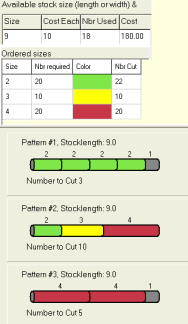What's New - November 2010
[Home]
November 4, 2010: The "Chinese Remainder Theorem" says that if you have an unknown number of items but know the remainders when you divide by 2 or more relatively prime numbers, then there is a unique smallest answer. Our Chinese Remainders program solves this type of problem. The following sample was added today:
Cristine has a number of flowers that she wants to put into arrangements.
If she puts them in groups of 2 she has 1 left over.
If she puts them in groups of 3 she has 2 left over.
If she puts them in groups of 4 she has 3 left over.
If she puts them in groups of 5 she has 4 left over.
If she puts them in groups of 6 she has 5 left over.
If she puts them in groups of 7 she has 0 left over.
What is the smallest number of flowers that Christina could have?

November 11, 2010: Lots of time spent deer hunting this week, but no luck so far. The deer became nocturnal much earlier in the season than usual this year so only the young, dumb, ones are stirring during the day. It's a long season though so, like programming, I believe that persistence will pay off in the end.
I did find time to correct a problem with our Cutting Stock
program. Cutting Stock addresses the problem of how to efficiently cut
required one dimensional parts (length or width) from available supply stock.
In 2007, I added the ability to handle required part and stock lengths which
were not integers. It worked when cases were initially entered , but not
when read from a saved case.
Cutting Stock Version 4 posted today, should fix that.
November 18, 2010: I bagged my first deer of the season this week, so I'm taking a break until my grandson visits to hunt over Thanksgiving next week. Time left over to solve this problem "Find 3 different two digit primes with the property that the mean (arithmetic average) of any two and of all three are also prime". Find 3 Primes in our Delphi Techniques section finds the only such set in a few milliseconds. Simple routines illustrate how to generate prime numbers and how to check for prime means among the 7980 three-member subsets.
